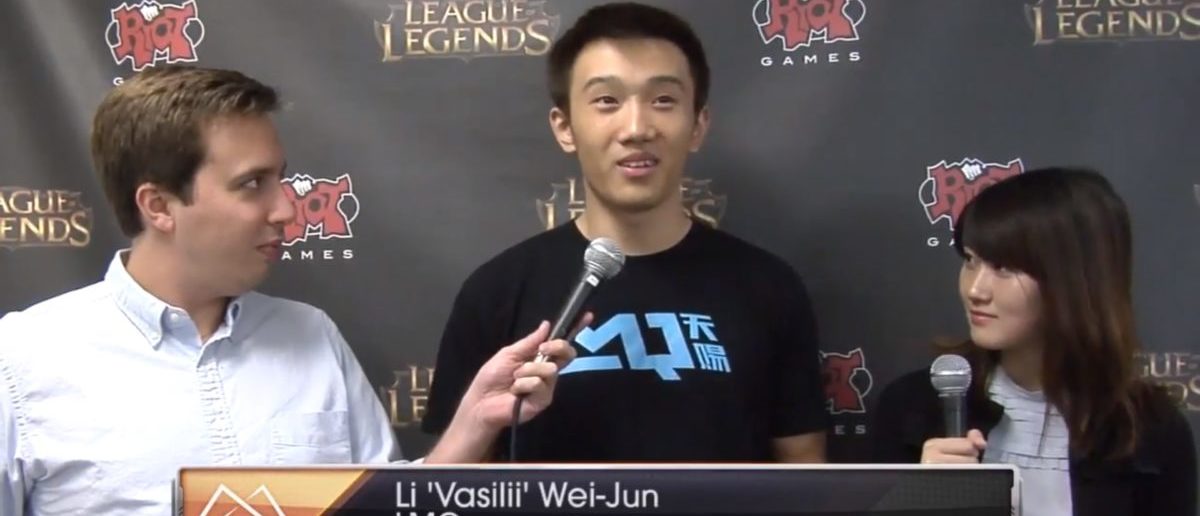Esports passed its first test last week when faced with a high-profile domestic violence incident.
The term “esports” refers to a multitude of video games played competitively — like League of Legends, Super Smash Bros and Overwatch. Much like the National Football League or any other traditional sport, esports has distinct teams, players, rules, regions and so on.
Li “Vasilii” Wei Jun, a professional player on League of Legends team Newbee, was recorded on camera allegedly assaulting his girlfriend. In the video, which was streamed live online, Vasilii flipped his desk over and could be heard yelling off-camera and repeatedly hitting something. His girlfriend could also be heard screaming and crying. He was later arrested.
Newbee’s response was the correct one: termination of his contract. “Vasilii’s contract with Newbee is terminated immediately for commiting [sic] acts of violence during a live broadcast. We are deeply shocked, heartbroken and regretful. Newbee will not tolerate such behavior under any circumstances,” reads Newbee’s English statement Thursday.
Riot Games, the company that owns League of Legends, quickly announced Friday he had been suspended “effective immediately from all professional, semi-professional, and Riot-sanctioned competitive play. The full extent of his suspension will be confirmed once the investigation has concluded.”
Compare these responses to the NFL’s with Ray Rice in 2014 when video surfaced of him punching and knocking out his then-fiance, Janay Palmer, and dragging her unconscious body out of an elevator. The NFL’s domestic violence rules were vague, and Rice received a two-game suspension. Only after public outcry when the video was released did the Baltimore Ravens release Rice and the NFL suspend him indefinitely.
The Chicago Bears signed Ray McDonald in 2015 despite his being released by the San Francisco 49ers after being indicted for rape and being involved in multiple domestic violence incidents.
New York Giants kicker Josh Brown initially received a one-game suspension for domestic violence in 2015. That suspension turn into six more games after Washington state police released additional information.
Football lends the quickest examples of violent tolerance, but its players are far from the only ones getting off easy.
Boxer Floyd Mayweather Jr. pleaded guilty to domestic violence in 2010. He made upwards of $180 million in 2017 for his fight against Conor McGregor.
Fans are culpable in allowing this behavior, too. We attend games, buy TV packages and team gear and raise brand importance by supporting and engaging in discussion about these sports.
Esports got it right this time. What about next time?
The young industry is growing at a rapid rate and is expected to hit more than $1 billion in revenue by 2020 and boast viewership of 427 million by 2019. Brands you’d see advertising during the Super Bowl are popping up at championship video game events, sponsoring teams and creating partnerships. Sports channels like ESPN, Fox Sports and Sky Sports now show tournaments live.
There’s a wealth of prestige to be had in being a professional video game player, and with that comes the uglier side of fame and fortune. This domestic violence incident is the most prominent esports has had to face, and it won’t be the last. Newbee and Riot got it right this time, but what about when there’s no video? How will teams and companies deal with accusations in the future that may not be so cut and dry?
How will teams navigate a player’s value, the pressure to win and union rules? What if the story doesn’t go viral, will it simply be swept under the rug with a slap on the wrist and a fine? Should players get second chances or will it be a blanket zero tolerance policy? And if a player is accused incorrectly of some impropriety, what then?
I reached out to multiple esports teams to ask if they have, or intend to, implement domestic violence rules in the wake of the Vasilii scandal. As of this piece’s publishing, none of the teams have responded.
These questions don’t pertain only to domestic violence. Esports will have to contend with drugs, drinking, assault and a host of other illegal activities. Do teams have plans in place to prepare players for the influx of public awareness and money they will receive and how to manage both?
Now is the industry’s chance to define itself and set up countermeasures against the sins of greed and power.
Questions like these may seem unsettling. Being uncomfortable doesn’t make them less true, it makes them all the more important to tackle. In an ideal world, the idea of mishandling a Rice-like situation would be unfathomable. Ours is not an ideal one. The temptations of money, acclaim and glory cause people to behave differently than they would otherwise. Ignoring these facts — no matter how distasteful they are to discuss — will taint esports as a breeding ground for deviant leniency.
Confirmed cases of violence against women should be the kiss of death to any professional esport player’s career. It does not matter the game or the company that makes it, this is about whether or not we’ll continue to value women by the number of suspensions they garner, or by the standard of decency befitting a human being.
Esports has a chance to foster the high caliber of player conduct that could eventually affect change in other sports, like football. It has an opportunity no one else does by virtue of being new.
Vasilii’s end is a good start in a positive direction. Let’s hope esports can stay the course.
Signup for The Daily Walkthrough and follow us on Twitter, Facebook and YouTube

